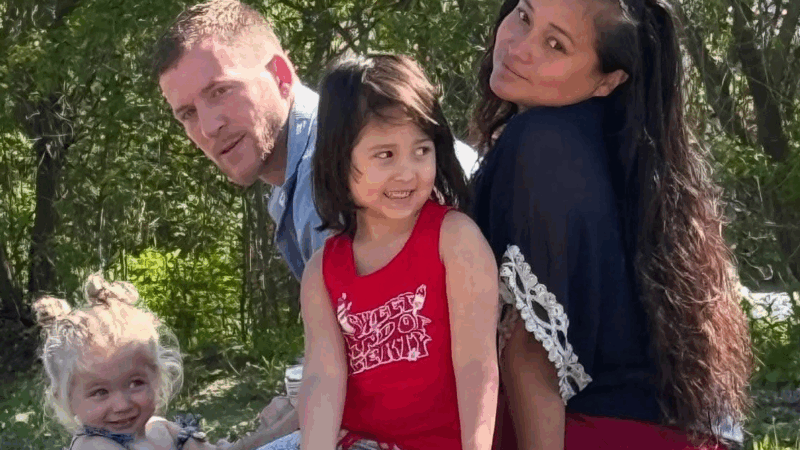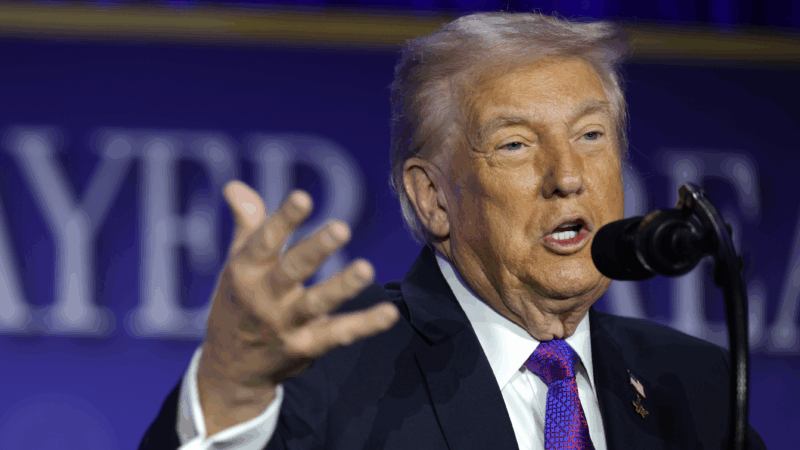The federal shutdown puts nutrition aid for millions of new parents at risk
The federal shutdown won’t impact benefits from major programs such as Medicare, Medicaid and Social Security. But one of the first things that could get hit is the nutrition assistance that many pregnant women and new parents depend on.
It’s been crucial for Lucia Graves, who found out she was pregnant back in March 2020, just days before the world shut down for the Covid-19 pandemic. She was a waitress at the time and on her own financially.
“So here I am like, ‘Oh my goodness. I have this baby on the way, and now I have no job,’ ” she says.
Graves lives in Lebanon, N.H. She had pregnancy complications, her daughter was born a month early, and after breastfeeding just a short while, her milk ran dry. It was a big relief when a social worker said Graves was eligible for the Special Supplemental Nutrition Program for Women, Infants, and Children, which is known as WIC.
“They were able to cover baby formula, which is huge,” she says. “They gave us like 10 or 12 cans each [month]. That still didn’t cover everything that my child needed, but it covered a lot.”
WIC also provides breastfeeding support, nutrition counseling and serves children up to age 5. That’s nearly 7 million people in all, including nearly half of all infants born in the U.S.
Graves is now engaged, and her fiancé also has a young daughter. Both girls are eligible for $26 a month for fruit and vegetables, plus a list of WIC-approved groceries. If that ends, she says it would be harder to eat healthier and to make ends meet.
“The prices of milk, the prices of eggs, prices of bread. All of these things are, like, astronomical,” she says. “So it would be a huge hit to us.”
That hit could come a lot sooner than in the last government shutdown, in 2018. That’s because this one falls right at the start of the federal fiscal year. Since Congress has not yet passed a new budget, there’s no new money for agencies to spend.
“We have a really short runway here before we would reach a real crisis in program operations,” says Nell Menefee-Libey with the National WIC Association. She calculates that runway at about two weeks.
The money to keep things going for that long will come from a contingency fund, whatever’s left over from last year’s budget and rebates from infant formula companies, she says. Then states would need to fill the gap. “And there will also be some variation between states, because they may have different amounts of resources on hand,” she says.
The day before the shutdown, Colorado lawmakers approved $7.5 million to fund WIC in their state. The last time the government shut down, states got reimbursed for that spending.
Research shows WIC improves pregnancy and birth outcomes, children’s development and their lifelong diet, all of which reduces healthcare costs. But if the shutdown drags out, Menefee-Libey says some WIC offices will have to triage. That will mean prioritizing women who are pregnant and breastfeeding, and turning away pre-school-age kids.
“If people are turned away, you don’t get them back,” she says. “That is the opportunity to reach your family during these really critical and vulnerable life stages. And turning someone away means losing an opportunity for a healthy future for a child.”
Beyond WIC, the country’s much larger food aid program — the Supplemental Nutrition Assistance Program, or SNAP — is in better shape moneywise. That’s because the debit-like cards people use to buy food are loaded a month in advance.
“Their benefits are going to be there for October. And anyone who is eligible should feel free to apply,” says Gina Plata-Nino with the Food Research & Action Center.
Food banks are also still open and prepping for more demand from federal contractors and employees who are now furloughed or forced to work without pay.
During the last shutdown, “we did have people in suits waiting at food banks,” Plata-Nino says. “Because there was no money coming in, and people had to pay their rent.”
She hopes it won’t come to that this time.
In Berlin, there are movies, there’s politics and there’s talk about it all
Buzz around whether the city's film festival would take a stance on the war in Gaza has dominated conversation in recent days.
Alex Ferreira wins 10th gold medal for Team USA, matching America’s highest total in Winter Olympics
Freeskier Alex Ferreira clinches a tenth gold medal for the U.S. in these Games, tying the U.S.'s all-time record for gold medals in a Winter Olympics.
Trump calls SCOTUS tariffs decision ‘deeply disappointing’ and lays out path forward
President Trump claimed the justices opposing his position were acting because of partisanship, though three of those ruling against his tariffs were appointed by Republican presidents.
The U.S. men’s hockey team to face Slovakia for a spot in an Olympic gold medal match
After an overtime nailbiter in the quarterfinals, the Americans return to the ice Friday in Milan to face the upstart Slovakia for a chance to play Canada in Sunday's Olympic gold medal game.
NASA eyes March 6 to launch 4 astronauts to the moon on Artemis II mission
The four astronauts heading to the moon for the lunar fly-by are the first humans to venture there since 1972. The ten-day mission will travel more than 600,000 miles.
Skis? Check. Poles? Check. Knitting needles? Naturally
A number of Olympic athletes have turned to knitting during the heat of the Games, including Ben Ogden, who this week became the most decorated American male Olympic cross-country skier.








